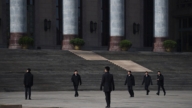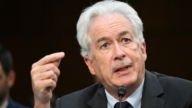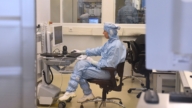【新唐人2013年11月11日讯】中共三中全会正在闭门召开,此前放出的土地改革,给外界一种中共“要变了”的错觉,不过,从内部人士透露出的消息则发现,新土改没有多少新意。有评论认为,中共新政意欲改革,但拚命保党的底线,使得他们在中共上下内斗中,束缚手脚,以致事与愿违。
据《中国经营报》转述国土资源部人士的消息说,土地改革已经定调,“城建开发用地”可能列入公益用地范畴。这代表城市周边未来将变成城市区域内的农村集体土地,仍将由政府实施征收,才能进入建设用地市场进行交易。目前已经列入“列举”征地范围的土地包括:教育、能源、基础设施、国防设施、政府用地等。
大陆金融分析师任中道:“作为土地改革来说,如果征地制度不改变的话,一切都没有什么变化,虽然他用教育用地,公益用地去征地,但实质上,中共随时都可以更改,征下来之后,放一段时间去做房地产都可以的,因为本身制度是他自己定的。”
消息还说,“土改”包括﹕土地“招拍挂”出让制度、和农村集体土地流转试点、以及宅基地流转试点等改革。
时政评论员林子旭:“中共在三中全会以后或许有可能去搞一些试点,让老百姓对中共又产生一些幻想,这样中共又能找到一些喘息的空间,但是本质上想要把地方政府获利最大的土地出让权交出来,根本不可能。”
大陆金融分析师任中道指出,面对内外交困的政治经济形势,中共新政企图推行一些经济改革,但是中共高层各派利益集团的纷争,盘根错节的扎根在各地方政府之间,各路诸侯各自为政,遇到的阻力特别大。中共高层居于恐惧中共崩溃,会更加集权。
11月8号,国务院总理李克强通过中共党媒放狠话,他说,地方政府改革是一场自我革命,要义无反顾,并说,地方政府原则上不再直接投资办企业。
分析人士表示,至此,中央基本将地方政府资金来源堵死,例如,地方政府不能直接发债券,只能由中共财政部代发﹔另外,启动营业税改增值税,将地方政府第一大税种上收到中央﹔地方政府融资平台的城投公司,不可以再融资及发城投债。
不过多数专家认为,地方政府会为自我利益处处抗衡中央,消极抵制中央的指令。
林子旭:“习、李的现状非常清晰,一,他们不敢动中共这个体制,二,他们有来自江派激烈的权斗压力,真的要动地方土地这块奶酪,江派就很有可能借助地方势力的不满把习、李搞掉,这种利益再分配带来的冲击都很有可能让整个中共垮台。”
中共地方政府以低廉的价格甚至无偿从农民处征收土地,而后翻倍加价作为建设用地对外出售。经济学家吴敬琏估算,土地价差保守估计为地方政府,大赚了30万亿元左右。
另一方面,到今年(2013年)底,总计有53%的地方债务到期需要偿还。地方政府为避免因高起的债务而崩溃,势必拚命保住能随时变现的土地。
不过大陆房地产业内指出,不断升高的土地价格,只能导致一赢双损的结局,地方政府拿到了高溢价的土地收益,开发商却因为政府限价而利润变薄,购房者则要直接面对房价不断上涨。
不断提高的土地出让价格,也导致大陆“地王”频现,今年9月,北京朝阳农展馆附近地块,折合楼面价格超过每平方米7.3万元,成为北京市场名符其实的单价新地王。
中国经济体制改革研究会特聘研究员毛寿龙向《新唐人》透露,土地改革将通过建立“城乡统一的建设用地市场”,其中最大阻力是传统的法律和政策。另外,反对方还提出很多顾虑,比如建设用地进入农村以后,会不会导致环境污染﹖或者,失地农民变成流民以后会不会成为国家的负担﹖而城里人在农村买了地不开发,或掌握了很多土地,会不会形成新的地主﹖等等。
采访编辑/刘惠 后制/萧宇
Third Plenary Session Sets Tone for ‘Land Reforms’
The Chinese Communist Party (CCP) is conducting
the Third Plenary Session behind closed doors.
It is trying to create the illusion that the Party is changing,
but inside sources suggest land reforms remain unchanged.
Our experts believe the new leadership
is insistent on trying to save the CCP.
It is complicated with internal fighting,
and has made reforms impossible.
China Business Journal quoted a source
from the Ministry of Land and Resources.
A final tone for land reforms has been set.
“Urban development land” will include
development of public construction.
This means that the government will continue
land requisitions for market usage of rural land.
Constructions listed in development are education, energy,
infrastructure, defense installations, and government sites.
Ren Zhongdao, financial analyst: “Speaking
of land reform, if the land requisition system
does not change, then nothing will change.
In the name of education, or public construction, land can
be used for any project as long as the land is acquired.
It can be used for real estate
later, because they set this rule.”
The source said that land reforms also introduce
a land transfer auction system, land transfer pilot
station, and residential land transfer pilot station.
Lin Zixu, commentator: “After the third plenary,
the CCP might engage in some pilot activities.
This is to create a false image, so
that the CCP will get some relief.
Land rights have allowed local governments to
collect great wealth, so is unlikely to be changed.”
Financial analyst Ren Zhongdao analyses that the
CCP is politically and economically beleaguered.
The new leadership are meeting major resistance
from high-level vested interest groups,
which are rooted among local governments.
The CCP’s fear of the collapse will
only strengthen its authoritarian stance.
On November 8, the CCP media
publicized Premier Li Keqiang’s demands.
He said local government reform is a
self-revolution that can not be hesitated.
He also indicated that, in principle, local
governments will no longer invest in businesses.
Analysts indicate that the central regime has
blocked funding sources to local governments.
For instance, local governments cannot directly issue
bonds, which will be replaced by the Ministry of Finance.
A business tax reform will transfer the first major
local government takes to the central leadership.
City investment company, which often serves
as a local government financial platform will
no longer conduct financing or issuing bonds.
Most experts believe local governments will contend for
self-interest, and react passively to this central command.
Lin Zixu: “Xi and Li’s current status is very clear.
They would not dare to touch the CCP system.
They are also pressured by the fierce
power struggle from Jiang Zemins faction.
If they try to touch the local governments, Jiang’s
faction will get rid of Xi and Li with their local forces.
The CCP is likely to collapse from the
shock waves from redistribution of interests.”
The CCP local governments have been selling land for
construction at double the value of what it pays to the
farmers, who receive a very low price or even none.
Economist Wu Jinglian gives a conservative estimate
of 30 trillion yuan net earning for local governments.
This was earned through land requisition and selling.
On the other hand, by end of 2013, a
total of 53% of the local debts unpaid.
To avoid bankruptcy due to high debts, the local
government is bound to fight to keep land rights.
The Chinese real estate industry indicates that rising
land prices will only lead to one win and two lose.
The winner is the local government, which
gets a high premium on land revenues.
Both developers and home buyers are the losers
for thinning profit margins and rising real estate.
Expensive land appears because
of the increasing land prices.
In September this year, areas near Chaoyang
Agricultural Exhibition Hall in Beijing, were
valued at 73,000 yuan per square meter.
This has become the new expensive land in Beijing.
Mao Shoulong is a researcher for
China Society of Economic Reform.
Mao told NTD that land reform includes a ‘unified land
market for construction between urban and rural areas’.
However, outdated laws and policies
have become the biggest obstacles.
The opposition parties have also raised a lot of concerns.
For instance, will construction create
environmental pollution on rural land?
Will landless peasants become the country’s burden?
What if the city buyers control lots of
land but are not developing the land?
Will it simply create new land owners?
Interview & Edit / Liu Hui Post-production

























